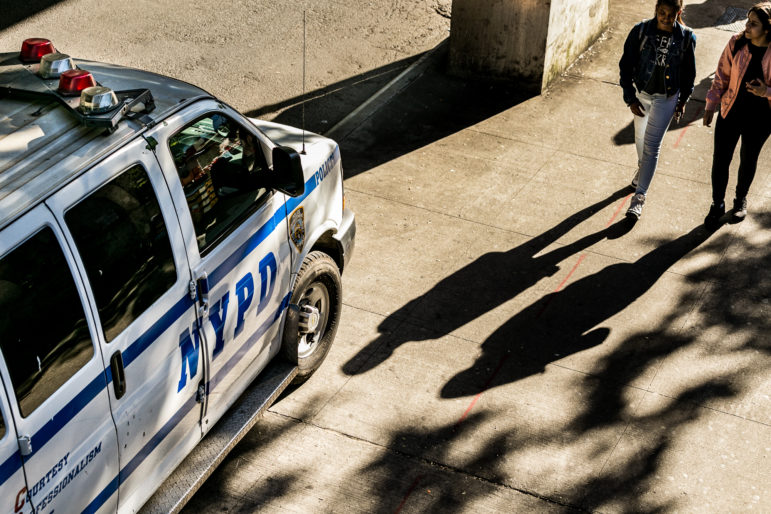‘Of the 33 cases we at PROP have seen this year, none entailing a serious charge, 30 involved New Yorkers of color—unsurprising since 90 percent of the more than 7,000 cases we have observed since beginning the Court Monitoring Project in 2014 also involved New Yorkers of color.’

Adi Talwar
The new Manhattan District Attorney Alvin Bragg, the first Black person to hold that post and whose campaign platform promised some progressive reforms, has been in office for one month. Despite his brief tenure, his planned agenda to reduce the severity of bail and the charging practices of his predecessor Cyrus Vance has already triggered a virtual firestorm of public outcry from right-wing politicians, law enforcement officials, and pro-law enforcement media.
Republican candidates for New York governor, Lee Zeldin and Andrew Giuliani, have called for Bragg’s recall or removal. A New York Post editorial claimed Bragg’s plans are “giving criminals the green light, plain and simple.” Mayor Eric Adams’ new police chief, Keechant Sewell, sent a critical email to NYPD officers stating: “I have studied these policies and I am very concerned about the implications to your safety as police officers, the safety of the public and justice for the victims.” Even the widow of recently slain police officer Jason Rivera criticized Bragg’s supposedly “soft on crime” policies while delivering a eulogy for her husband.
Bragg had issued a “Day One” memo directing his staff to no longer prosecute a number of low-level charges such as consenual sex work, fare evasion, and trespass when it didn’t involve stalking. It’s noteworthy that Vance’s office had already moved in a similar direction, also ceasing, for instance, to prosecute fare evasion and consensual sex work.
But the memo’s provision that drew the most aggressive push back, especially from Chief Sewell, was that Manhattan DAs would no longer pursue resisting arrest charges that stand alone or are coupled with lesser charges. (We should note here that Bragg recently backpedaled a bit in tone and substance from his Day One memo. He issued a much shorter memo last Friday promising, for example, that his office would more aggressively prosecute gun charges and any violence against police officers.)
Research and experience tell us that the vast majority of resisting arrest charges in the city are filed against New Yorkers of color. Also, public defenders credibly claim that police officers often apply such charges to cover up their violent or abusive treatment of defendants.
In addition, as stated in a revealing New York Times article: “. . . a review of court records from recent years indicate that the type of resisting arrest cases Mr. Bragg’s prosecutors will no longer pursue are exceedingly rare in Manhattan and in the city overall, suggesting that some of the resistance to Mr. Bragg’s agenda has little to do with his policies’ real world effects.”
The Court Monitoring Project of the Police Reform Organizing Project (PROP), where I work, enables New Yorkers to gain an up close view of the “real world effects” of Bragg’s agenda.
This effort entails sending our staff, interns, and volunteers into the arraignment parts of the criminal courts of the city’s five boroughs. There we observe and record the daily proceedings, a kind of field research that, because everybody who gets arrested in New York City has to be arraigned, enables us to effectively track NYPD arrest practices.
Because of the most recent COVID surge, we put a temporary hold on The Project last month and only returned to the Manhattan courts two weeks ago. We have observed 33 cases and had several conversations with public defenders on site and over Zoom. The initial consensus—theirs and ours—is that Bragg’s “reforms” have so far had modest “effects” at best, involving better plea offers in some cases and a general reduction in bail requests to judges.
We reformers welcome even these modest advances that will result in fewer New Yorkers needlessly subjected to the harsh practices of our criminal legal system, including being locked up in the hellish conditions on Rikers Island. But even so, and reflecting the substantive limits of what constructive changes well-intentioned “progressive” prosecutors like Bragg can achieve, the worst effects, as matters of justice and humanity, of the system persist: the daily harm and hardship inflicted on New Yorkers and for no good reason.
Of the 33 cases we at PROP have seen this year, none entailing a serious charge, 30 involved New Yorkers of color—unsurprising since 90 percent of the more than 7,000 cases we have observed since beginning the Court Monitoring Project in 2014 also involved New Yorkers of color.
Apparent, too, was that some defendants, if not most, appeared disoriented as they stood before the judge, unsteady on their feet and dressed poorly. One man seemed to experience drug withdrawal chills—he wobbled to a bench in the back of the courtroom when the judge granted him supervised release. Along with the lawyers we spoke to, we figured that a number of the people were unhoused and/or struggling with mental illness or both. Such is the condition of many humans who serve as grist for the mill of NYPD arrest practices.
The principal takeaway here is that despite the loud noise, pro and con, surrounding the agenda of Mr. Bragg and other like-minded district attorneys, their efforts will not really alter the deeply entrenched and highly corrosive “real world effects” of blatantly racist police practices, the central cog in the machinery driving what some people call the casual, everyday brutality of our so-called justice system.
Robert Gangi is the executive director of the Police Reform Organizing Project (PROP). Prior to founding PROP in 2011, he was executive director of the Correctional Association for over 29 years.









